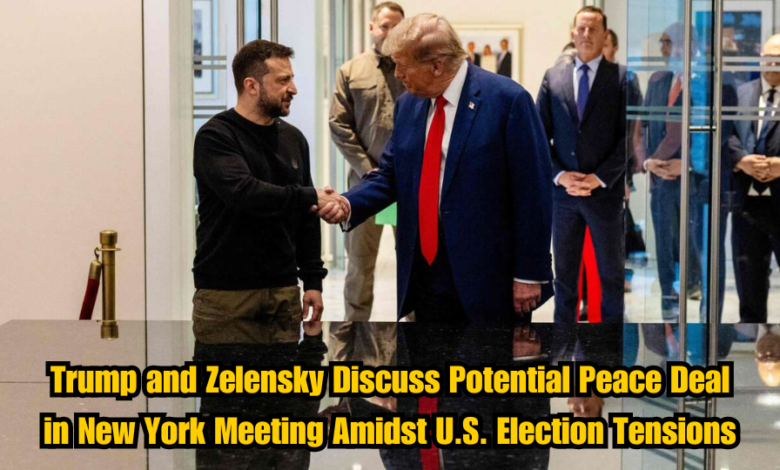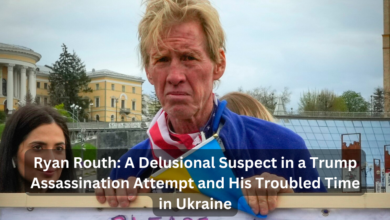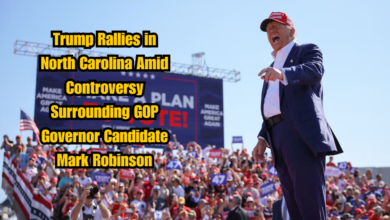Trump and Zelensky Discuss Potential Peace Deal in New York Meeting Amidst U.S. Election Tensions

In a rare and tense meeting, former President Donald Trump stood alongside Ukrainian President Volodymyr Zelensky, making headlines with his statements about brokering a potential peace deal between Russia and Ukraine. The meeting, which took place in New York, comes at a critical juncture as the U.S. presidential election looms, with Trump promising a resolution that he claims would be “good for both sides.” This statement raised eyebrows, particularly given the ongoing war in Ukraine and the longstanding U.S. commitment to supporting Ukrainian sovereignty.
Trump Suggests a Balanced Resolution for Russia and Ukraine
The meeting between Trump and Zelensky took place on Friday, offering a significant opportunity for the two leaders to address their differing perspectives on the Russia-Ukraine war. Trump, who has previously voiced skepticism about continued U.S. military support for Ukraine, emphasized his relationship with both Zelensky and Russian President Vladimir Putin. He reiterated his confidence that, if elected, he could negotiate a deal that would bring an end to the conflict.
“We have a very good relationship, and I also have a very good relationship with President Putin,” Trump stated. “If we win, we’re going to get it resolved very quickly,” he added, suggesting that a resolution could be reached before his potential inauguration in January 2025. Zelensky, while appreciative of the meeting, maintained a cautious tone, underscoring the importance of Ukraine’s sovereignty and the need to push Russian troops out of Ukrainian territory.
A Meeting Fraught with Political Implications
The timing of the meeting is particularly notable. Zelensky’s visit to New York came just one day after meeting with President Joe Biden and Vice President Kamala Harris in Washington. While Biden and Harris have emphasized unwavering support for Ukraine’s defense, Trump’s stance has been far more ambiguous. His previous remarks about potentially reducing U.S. aid and his criticism of Zelensky have left many questioning his long-term strategy.
This meeting, therefore, represents more than just a diplomatic exchange—it highlights the stark contrasts in foreign policy between the Republican and Democratic approaches to the ongoing war. As Trump positioned himself as a potential peace broker, his Republican allies have doubled down on a narrative that suggests Zelensky is resistant to compromise, an accusation that Zelensky firmly rejected during their meeting.
Zelensky Pushes Back: “Putin Must Be Stopped”
For Zelensky, the stakes of the New York meeting were high. He has faced an uphill battle convincing not only the U.S. but also other Western allies to continue supplying the military support necessary for Ukraine to resist Russian advances. During the brief press interaction, Zelensky reiterated his position that any resolution must ensure the complete withdrawal of Russian forces from Ukrainian land.
“We have a common view that the war in Ukraine has to be stopped, and Putin can’t win,” Zelensky asserted. “Ukraine has to prevail, and I want to discuss with you the details about that.” His statement underscores Ukraine’s steadfast opposition to any concessions that would compromise its territorial integrity or leave Russian troops in control of occupied areas.
Trump Hints at a Quick Resolution, But Offers No Details
After their meeting, Trump appeared on Fox News alongside Zelensky, where he continued to stress his belief that a “fair deal” could be reached swiftly, though he did not elaborate on what such a deal would entail. “It’s got to be fair, and I think that’ll happen at the right time. I think it’s going to happen,” Trump told the interviewer. When pressed on what a “fair” agreement might look like, Trump demurred, saying it was “too early to say that.”
This lack of specificity has fueled skepticism among analysts who point out that brokering a deal that satisfies both Kyiv and Moscow’s interests is a daunting challenge. For Zelensky, whose people have endured the brunt of Russia’s aggression since February 2022, any agreement that falls short of restoring Ukraine’s borders is unlikely to be acceptable.
Political Calculations in the U.S. Election Landscape
The implications of Friday’s meeting extend far beyond U.S.-Ukraine relations. With the 2024 U.S. presidential race heating up, Trump’s posture towards Ukraine has become a key point of differentiation from his opponents. Democratic nominee Kamala Harris, who met Zelensky in Washington, used the occasion to draw a stark contrast with Trump’s approach.
“There are some in my country who would instead force Ukraine to give up large parts of its sovereign territory, who would demand that Ukraine accept neutrality and forego security relationships with other nations,” Harris remarked, clearly referencing Trump’s criticisms. Harris’s statements were aimed at solidifying the Democratic Party’s position as a steadfast ally of Ukraine, contrasting it sharply with Trump’s more transactional approach.
Echoes of Past Impeachment Scandals
The historical baggage between Trump and Zelensky also loomed over the meeting. Their last encounter, in 2019, became a pivotal moment in Trump’s first impeachment, when he was accused of withholding U.S. aid to pressure Zelensky into investigating then-presidential candidate Joe Biden. At the time, Trump praised Zelensky for not “grandstanding” during the controversy, but the incident left a lasting impact on U.S.-Ukraine relations.
On Friday, Trump again referenced the impeachment saga, commending Zelensky for his handling of the situation. “He could’ve grandstanded and played cute, but he didn’t do that,” Trump said. However, the circumstances of this meeting—against the backdrop of a brutal and protracted war—are dramatically different from their first encounter.
Republican Criticism of Zelensky and the War Effort
The meeting also took place against the backdrop of rising skepticism within the Republican Party about continued U.S. support for Ukraine. Trump’s allies in Congress have been vocal in their criticism, particularly after Zelensky’s recent visit to a Pennsylvania ammunition plant with Democratic Governor Josh Shapiro. The visit was perceived by some as politically motivated, aimed at shoring up support among voters of Ukrainian descent in a key battleground state.
House Speaker Mike Johnson went so far as to call for the removal of Ukraine’s ambassador to the U.S. in response. Meanwhile, GOP vice-presidential candidate JD Vance has been labeled as “too radical” by Zelensky in a recent interview, fueling tensions between the Ukrainian leader and the Republican establishment.
Trump’s Remarks Ignite Fresh Controversy
At a rally on Wednesday, Trump intensified his criticism of Zelensky, accusing him of being unwilling to negotiate. “There was no deal that he could have made that wouldn’t have been better than the situation you have right now,” Trump said. “You have a country that has been obliterated, not possible to be rebuilt.” These comments sparked a backlash, with many pointing out that any potential deal must take into account the realities of Russian aggression.
Trump’s ambiguous stance on whether Ukraine should cede territory to Russia has left the door open for various interpretations. When asked directly about this issue, he responded with characteristic vagueness: “We’ll see what happens.”
What’s Next for U.S.-Ukraine Relations?
With Trump and Zelensky’s New York meeting now in the rearview mirror, the question remains: what impact will it have on U.S. policy towards the Russia-Ukraine conflict? If Trump wins the 2024 election, his stated aim of quickly brokering a peace deal will face immense scrutiny, both at home and abroad. For Zelensky, any settlement must not only end the bloodshed but also ensure Ukraine’s long-term security and sovereignty.
As the 2024 presidential race unfolds, the stakes for Ukraine could not be higher. Whether Trump’s vision of a “fair deal” materializes, and what that might look like in practice, will be pivotal for the future of the region. For now, Zelensky appears committed to holding his ground, making it clear that any agreement must prioritize pushing Russian forces out of Ukrainian territory—a stance that may prove difficult to reconcile with Trump’s promise of a swift resolution.
With the world watching, the next few months will reveal whether Trump’s confidence in brokering peace is well-founded or merely campaign rhetoric aimed at reshaping U.S. foreign policy in the region.




